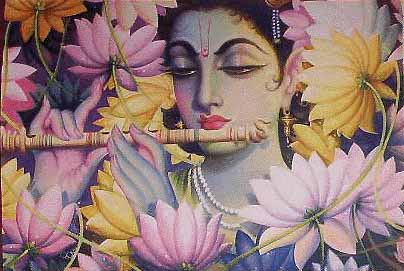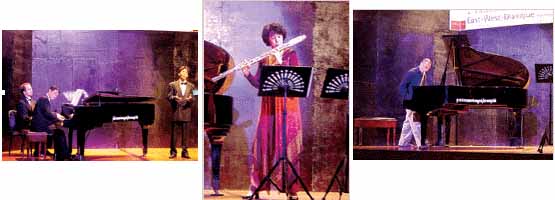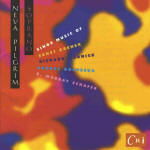Krsna Goes Classical
BY: SUN STAFF

Nov 26, USA (SUN) — Earlier this month we were pleased to present “Vrindaban’s Woods and Groves”, a classical choral rendition of Jaya Radha Madhava, sung in English. The piece was orchestrated and directed by Hrishikesh dasa, and sung by Bhavisya devi dasi along with past and current members of the New Vrindaban community. Members of the Pittsburgh Symphony Orchestra and the Butler County Symphony participated, along with other musicians. The group hopes to produce an entire album of similar works in the future.
The past Acaryas have given us a wealth of beautiful Vaisnava songs, and there are endless Krsna lila pastimes about which future songs might be written. Thanks to the mercy of Sri Caitanya Mahaprabhu, Krsna Consciousness has now been spread to towns and villages across the planet. Given the fact that nearly every developed nation in the world has developed its own unique style of classical music, it's only a matter of time before a great number of music composers make Lord Krsna the object of new classical compositions.

Lord Krsna in Classical Cambodian
In Cambodia recently, the second annual Phnom Penh Music Festival featured a theme of "East meets West" music.
In a contemporary piece entitled "Krishna e Radha", by Italian composer Giacinto Scelsi, two instrumentalists representing these two transcendental personalities conducted a dialogue using piano and flute. The musical dialogue moved back and forth, representing Radha and Krsna in conversation.
While the first Phnom Penh Music Festival focused on a theme related to the chronological development of Western orchestral music from baroque to classic, and romantic to contemporary, this year's festival was aimed at cross-cultural learning and exchange between Asian and Western musicians through six days of concerts and performances.
U.S. flautist Carin Levine was one of the prominent Western musicians who took part in the festival. She said, "We are putting all our efforts into reviving that scenario and revitalising the consciousness of the Cambodian people concerning their own classical music traditions." How wonderful that part of this process included a rendition of Sri Sri Radha-Krsna's pastimes!
Sri Krsna's Musical Appearances
Another notable example of Sri Krsna's manifestation in Western classical music can be found in a piece entitled "Songs in Praise of Krishna" by the late George Rochberg (1918-2005), a celebrated American composer. Rochberg was presented with an award for excellence by Brandeis University, who said:
"We celebrate George Rochberg for his craft, poetry, and determination to melt the ice in contemporary music…Rochberg is a towering figure in American music. For over thirty years he has been a vibrant teacher and leading American composer - questioning, eloquent and deeply serious… His work reunites us with our musical heritage and provides a spiritual impetus to continue."
Written in 1970, "Songs in Praise of Krishna" was first performed by Rochberg and soprano Neva Pilgrim at the University of Illinois, in March 1971. The entire work, which runs for approximately 33 minutes, contains the following fourteen Movements:
As the Mirror to My Hand
Beloved, What More Shall I Say to You?
Her Slender Body
Hymn to Krishna (I): After Long Sorrow
Hymn to Krishna (II): It Was in Bitter Maytime
I Brought Honey
I Place Beauty Spots
Let the Earth of My Body
Lord of My Heart
My Mind is Not on Housework
My Moon-Faced One
O Madhava, How Shall I Tell You of My Terror
O My Friend, My Sorrow is Unending
Shining One
The texts for this cycle of 14 songs were drawn from a small volume titled "In Praise of Krishna", translated from the Bengali by Denise Levertov and Edward C. Dimock, Jr. Rochberg set the poems as though they were a libretto for an opera. While mundane operatic works focus on the passions of human love, Radha and Krsna's loving pastimes elevate the drama to the platform of divinity.
In the composition, three characters speak: Radha, Krsna, and an older woman who is Krsna's messenger to Radha. Each character has his or her own unique music. Since Radha is at the center of the poems, she sings ten of the fourteen songs.
As described by a reviewer in the Database of Recorded American Music: "The work is highly chromatic, but with tonal centers. In order to bring out the psychology of what might be called `internal opera', Rochberg used considerable variety…. When the cycle begins, we are literally at the end of the story: Hymn I “It was in bitter maytime” Radha is describing how Krishna has left her. She is full of the pain of loss. The events of Hymn II, “After long sorrow” though appearing as the second song of the cycle, occur somewhere halfway through the story; Krishna has returned and Radha alternates between the pain of remembering his absence and the joy of having him back. From numbers 3 to 14, the final song of farewell, each song encapsulates a different shade of the progression of Radha's passion. Krishna's songs, numbers 3 and 11, are interpolations of a kind to show the character of Krishna whose love for Radha is curiously remote, yet full of sweetness and desire. In her two songs, numbers 9 and 10, the old woman messenger pleads with Radha and flatters her, all with the intention of softening her anger against the newly returned Krishna."
Since being recorded at the RCA studios in New York City, "Songs in Praise of Krishna" has also been released in published sheet music, and has been performed many times at Rochberg festivals and by various choral groups.

Neem Pilgrim, "Songs in Praise of Krishna"
The "Songs in Praise of Krishna" album may be purchased at: CNYClassicalCDs.com
